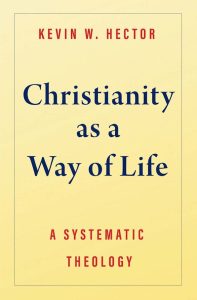 Summary: Theological account of Christianity as a way of living, not simply as an intellectual system.
Summary: Theological account of Christianity as a way of living, not simply as an intellectual system.
In an overly simplified sense, the point of the book is to move Christianity from a series of propositional belief statements (thin) to a “thick” belief system where those beliefs matter to not just how we see the world, but what we do in the world.
I appreciate academic books because they often interact well with not just the ideas being discussed but the alternatives to those ideas. A good academic book should grapple with the best arguments which disagree. What I don’t always appreciate about academic books is that in general, academic books tend to have really long chapters because they are making a sustained argument that pays attention to not just their point, but everything around that point as well. Long chapters require a level of sustained attention that I do not always have.
I picked this up initially as an audiobook because it was cheater for me that way. But about halfway through the book I broke down and bought the (very expensive) Kindle edition. There are a number of really good quotes and I know I need to read the book again because there is nuance that I need to pay attention to. To try to keep the whole idea together, I tried to mostly listen to whole chapters while I was on a walk. This meant that I was not taking notes, but it meant that I was listening without much distraction.
So much of theology is about framing. Not in the sense that nothing is beneath the facade, but how you look at something matters. Hector’s framing takes seriously Christianity as an ethical system that calls us to action. His thin/thick metaphor which is common in theological discussion, assumes that while there is no perfection within the church, the church will be recognizable as doing church. Part of the problem with some of the discussion around Christian nationalism or cultural Christianity is that what is being held up as Christian doesn’t look like Christianity any longer. The following quote I think does a great job of illustrating that there is some point where what we are doing ceases to accurately reflect Christ.
“On the other hand, if a group of people did not embody Christ’s agency to some significant extent, it would no longer be recognizable as a church or even as trying to be a church. Think here of an anthropologist who is trying to understand the game of soccer by watching a couple of bad teams play. If the teams are so completely inept that the anthropologist cannot distinguish between intention and error, then the anthropologist will not be able to figure out what sort of game these teams mean to be playing just by watching them—the teams do not sufficiently embody the game, in other words. In the same way, there is an important difference between embodying Christ’s agency imperfectly and failing to embody that agency; if a church is so bad at bearing witness to Christ that it can no longer be said to embody his agency (albeit imperfectly), then it is fair to say that it would no longer merit the title of church.” p219
Part of what Emerson and Bracey were trying to do in Religion of Whiteness is identify when the center of the religious expression (belief and meaning structure) centers more on whiteness (cultural expression of white racial hierarchy) than on Christianity. Hector is approaching this not from the negative description that Bracey and Emerson are, but from a positive constructive theology.
There are only seven chapters in Christianity as a Way of Life and there is certainly more that can be said about Christianity than what is included here. Overly simplifying his argument, he lays out what theology is for, how we see the world, the impact of sin, how we are reoriented from sin to a new life, what it is like to be in the world as a new creation, being with others as a new creation and how we maintain a view of the end which keeps us grounded as Christians.
Hector is a professor at the University of Chicago, where I went to the divinity school, although I graduated 25 years ago now, so we didn’t overlap. He is approaching theology in a way that takes seriously the critique of theology from liberation theology or feminist and womanist theology. He regularly cites James Cone or Schleiermacher, Rosemary Radford Ruether, and others who are mistrusted in the more conservative evangelical world. Taking seriously critiques of modern theology does not mean that this isn’t grounded in the history of Christianity, because he interacted with Martin Luther, Augustine, Aquinas, Teresa of Avila, and others just as often.
I have been involved in a long reading project about Christian Discernment over the past year or so and I appreciate that Hector is taking seriously the ethics and wisdom orientation of Christianity. He isn’t reducing Christianity to wisdom or ethics, but theology that does not take seriously the ethical implications of its teaching or the way in which it has been influenced by Jewish wisdom systems as a grappling with complexity and nuance is oversimplifying what it means to be Christian.
As I have regularly written about, my favorite definition of spiritual formation is from M Robert Mulholland Jr, “Spiritual formation is a process of being formed in the image of Christ for the sake of others.” This may not be the best book if you have not explored theology in a more academic setting, but this is one of the best books of theology I have read that takes seriously what it means to live as a Christian.
Christianity as a Way of Life: A Systematic Theology by Kevin W. Hector Purchase Links: Hardcover, Kindle Edition, Audible.com Audiobook